Inter-Agency Working: Cultural Factors in Health and Social Care
VerifiedAdded on 2023/01/06
|14
|5661
|56
Report
AI Summary
This report analyzes a case study involving Mary and Ted, an elderly couple facing challenges related to Ted's vulnerability and Mary's caregiving responsibilities. The assignment explores inter-agency working, examining the multiple factors at play and the differing cultural needs within UK communities, particularly concerning information sharing. It delves into how information sharing is perceived as a cultural issue and its impact on health and social care delivery. The report identifies key agencies involved, assesses the attributes of an effective multi-disciplinary team, and analyzes leadership skills within the team, especially when information sharing is crucial. Finally, it offers a reflection on the student's learning regarding working with diverse cultural needs and in a multi-disciplinary setting, highlighting areas for practice development.

Inter-Agency Working
Paraphrase This Document
Need a fresh take? Get an instant paraphrase of this document with our AI Paraphraser

Contents
INTRODUCTION.....................................................................................................................................3
Question 1..................................................................................................................................................3
Analysis of the multiple factors in the case study and with reference to the differing cultural needs in
communities in the UK, particularly when to share information.............................................................3
Explain how information sharing is perceived as a cultural issue and how it impacts on the delivery of
health and social care...............................................................................................................................5
Key agencies that would be involved in dealing with this complex case.................................................6
Question 2..................................................................................................................................................8
Attributes of an effective multi-disciplinary team in dealing with this situation and the effect of
leadership within the team, particularly when there’s need to share information, given Ted
circumstances..........................................................................................................................................8
Critically analyze the type of skills a leader should possess to support the team as well as Ted?..........10
Question 3................................................................................................................................................11
Reflection on what you have learnt in relation to working with the differing cultural needs of the
communities involved............................................................................................................................11
Identify what areas of practice you need to develop in order to work well with a multi-cultural
community and in a multi-disciplinary team.........................................................................................11
CONCLUSION........................................................................................................................................12
REFERENCES........................................................................................................................................13
INTRODUCTION.....................................................................................................................................3
Question 1..................................................................................................................................................3
Analysis of the multiple factors in the case study and with reference to the differing cultural needs in
communities in the UK, particularly when to share information.............................................................3
Explain how information sharing is perceived as a cultural issue and how it impacts on the delivery of
health and social care...............................................................................................................................5
Key agencies that would be involved in dealing with this complex case.................................................6
Question 2..................................................................................................................................................8
Attributes of an effective multi-disciplinary team in dealing with this situation and the effect of
leadership within the team, particularly when there’s need to share information, given Ted
circumstances..........................................................................................................................................8
Critically analyze the type of skills a leader should possess to support the team as well as Ted?..........10
Question 3................................................................................................................................................11
Reflection on what you have learnt in relation to working with the differing cultural needs of the
communities involved............................................................................................................................11
Identify what areas of practice you need to develop in order to work well with a multi-cultural
community and in a multi-disciplinary team.........................................................................................11
CONCLUSION........................................................................................................................................12
REFERENCES........................................................................................................................................13
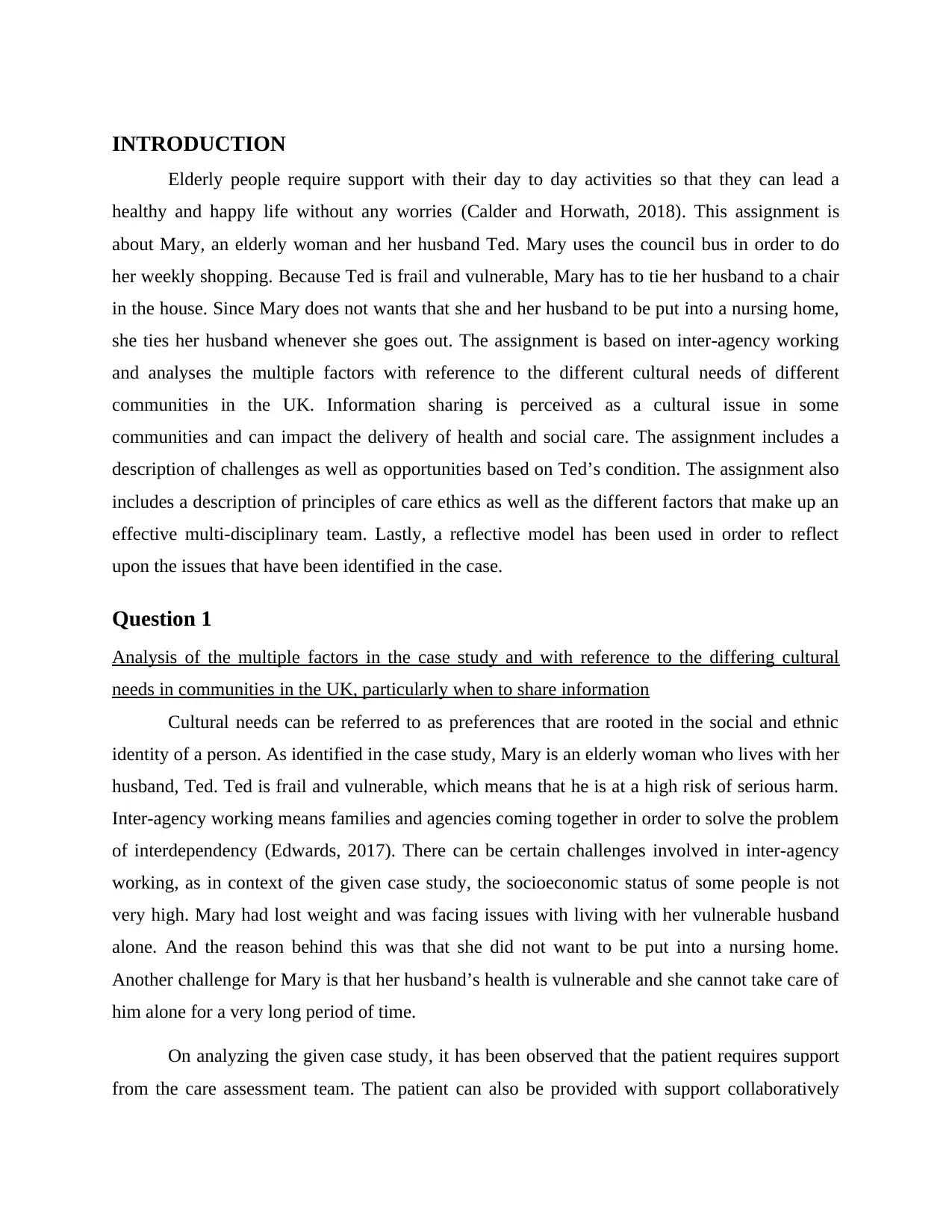
INTRODUCTION
Elderly people require support with their day to day activities so that they can lead a
healthy and happy life without any worries (Calder and Horwath, 2018). This assignment is
about Mary, an elderly woman and her husband Ted. Mary uses the council bus in order to do
her weekly shopping. Because Ted is frail and vulnerable, Mary has to tie her husband to a chair
in the house. Since Mary does not wants that she and her husband to be put into a nursing home,
she ties her husband whenever she goes out. The assignment is based on inter-agency working
and analyses the multiple factors with reference to the different cultural needs of different
communities in the UK. Information sharing is perceived as a cultural issue in some
communities and can impact the delivery of health and social care. The assignment includes a
description of challenges as well as opportunities based on Ted’s condition. The assignment also
includes a description of principles of care ethics as well as the different factors that make up an
effective multi-disciplinary team. Lastly, a reflective model has been used in order to reflect
upon the issues that have been identified in the case.
Question 1
Analysis of the multiple factors in the case study and with reference to the differing cultural
needs in communities in the UK, particularly when to share information
Cultural needs can be referred to as preferences that are rooted in the social and ethnic
identity of a person. As identified in the case study, Mary is an elderly woman who lives with her
husband, Ted. Ted is frail and vulnerable, which means that he is at a high risk of serious harm.
Inter-agency working means families and agencies coming together in order to solve the problem
of interdependency (Edwards, 2017). There can be certain challenges involved in inter-agency
working, as in context of the given case study, the socioeconomic status of some people is not
very high. Mary had lost weight and was facing issues with living with her vulnerable husband
alone. And the reason behind this was that she did not want to be put into a nursing home.
Another challenge for Mary is that her husband’s health is vulnerable and she cannot take care of
him alone for a very long period of time.
On analyzing the given case study, it has been observed that the patient requires support
from the care assessment team. The patient can also be provided with support collaboratively
Elderly people require support with their day to day activities so that they can lead a
healthy and happy life without any worries (Calder and Horwath, 2018). This assignment is
about Mary, an elderly woman and her husband Ted. Mary uses the council bus in order to do
her weekly shopping. Because Ted is frail and vulnerable, Mary has to tie her husband to a chair
in the house. Since Mary does not wants that she and her husband to be put into a nursing home,
she ties her husband whenever she goes out. The assignment is based on inter-agency working
and analyses the multiple factors with reference to the different cultural needs of different
communities in the UK. Information sharing is perceived as a cultural issue in some
communities and can impact the delivery of health and social care. The assignment includes a
description of challenges as well as opportunities based on Ted’s condition. The assignment also
includes a description of principles of care ethics as well as the different factors that make up an
effective multi-disciplinary team. Lastly, a reflective model has been used in order to reflect
upon the issues that have been identified in the case.
Question 1
Analysis of the multiple factors in the case study and with reference to the differing cultural
needs in communities in the UK, particularly when to share information
Cultural needs can be referred to as preferences that are rooted in the social and ethnic
identity of a person. As identified in the case study, Mary is an elderly woman who lives with her
husband, Ted. Ted is frail and vulnerable, which means that he is at a high risk of serious harm.
Inter-agency working means families and agencies coming together in order to solve the problem
of interdependency (Edwards, 2017). There can be certain challenges involved in inter-agency
working, as in context of the given case study, the socioeconomic status of some people is not
very high. Mary had lost weight and was facing issues with living with her vulnerable husband
alone. And the reason behind this was that she did not want to be put into a nursing home.
Another challenge for Mary is that her husband’s health is vulnerable and she cannot take care of
him alone for a very long period of time.
On analyzing the given case study, it has been observed that the patient requires support
from the care assessment team. The patient can also be provided with support collaboratively
⊘ This is a preview!⊘
Do you want full access?
Subscribe today to unlock all pages.

Trusted by 1+ million students worldwide
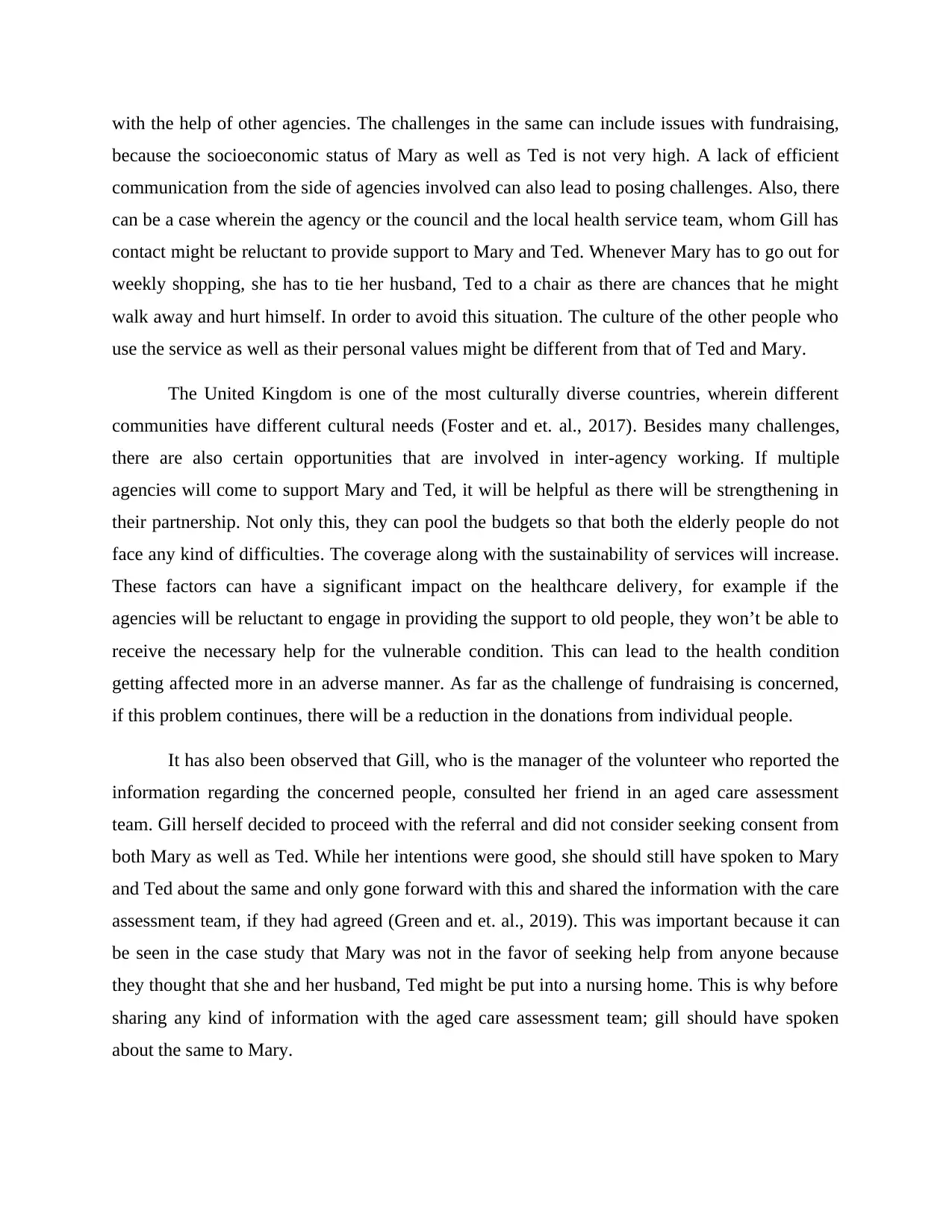
with the help of other agencies. The challenges in the same can include issues with fundraising,
because the socioeconomic status of Mary as well as Ted is not very high. A lack of efficient
communication from the side of agencies involved can also lead to posing challenges. Also, there
can be a case wherein the agency or the council and the local health service team, whom Gill has
contact might be reluctant to provide support to Mary and Ted. Whenever Mary has to go out for
weekly shopping, she has to tie her husband, Ted to a chair as there are chances that he might
walk away and hurt himself. In order to avoid this situation. The culture of the other people who
use the service as well as their personal values might be different from that of Ted and Mary.
The United Kingdom is one of the most culturally diverse countries, wherein different
communities have different cultural needs (Foster and et. al., 2017). Besides many challenges,
there are also certain opportunities that are involved in inter-agency working. If multiple
agencies will come to support Mary and Ted, it will be helpful as there will be strengthening in
their partnership. Not only this, they can pool the budgets so that both the elderly people do not
face any kind of difficulties. The coverage along with the sustainability of services will increase.
These factors can have a significant impact on the healthcare delivery, for example if the
agencies will be reluctant to engage in providing the support to old people, they won’t be able to
receive the necessary help for the vulnerable condition. This can lead to the health condition
getting affected more in an adverse manner. As far as the challenge of fundraising is concerned,
if this problem continues, there will be a reduction in the donations from individual people.
It has also been observed that Gill, who is the manager of the volunteer who reported the
information regarding the concerned people, consulted her friend in an aged care assessment
team. Gill herself decided to proceed with the referral and did not consider seeking consent from
both Mary as well as Ted. While her intentions were good, she should still have spoken to Mary
and Ted about the same and only gone forward with this and shared the information with the care
assessment team, if they had agreed (Green and et. al., 2019). This was important because it can
be seen in the case study that Mary was not in the favor of seeking help from anyone because
they thought that she and her husband, Ted might be put into a nursing home. This is why before
sharing any kind of information with the aged care assessment team; gill should have spoken
about the same to Mary.
because the socioeconomic status of Mary as well as Ted is not very high. A lack of efficient
communication from the side of agencies involved can also lead to posing challenges. Also, there
can be a case wherein the agency or the council and the local health service team, whom Gill has
contact might be reluctant to provide support to Mary and Ted. Whenever Mary has to go out for
weekly shopping, she has to tie her husband, Ted to a chair as there are chances that he might
walk away and hurt himself. In order to avoid this situation. The culture of the other people who
use the service as well as their personal values might be different from that of Ted and Mary.
The United Kingdom is one of the most culturally diverse countries, wherein different
communities have different cultural needs (Foster and et. al., 2017). Besides many challenges,
there are also certain opportunities that are involved in inter-agency working. If multiple
agencies will come to support Mary and Ted, it will be helpful as there will be strengthening in
their partnership. Not only this, they can pool the budgets so that both the elderly people do not
face any kind of difficulties. The coverage along with the sustainability of services will increase.
These factors can have a significant impact on the healthcare delivery, for example if the
agencies will be reluctant to engage in providing the support to old people, they won’t be able to
receive the necessary help for the vulnerable condition. This can lead to the health condition
getting affected more in an adverse manner. As far as the challenge of fundraising is concerned,
if this problem continues, there will be a reduction in the donations from individual people.
It has also been observed that Gill, who is the manager of the volunteer who reported the
information regarding the concerned people, consulted her friend in an aged care assessment
team. Gill herself decided to proceed with the referral and did not consider seeking consent from
both Mary as well as Ted. While her intentions were good, she should still have spoken to Mary
and Ted about the same and only gone forward with this and shared the information with the care
assessment team, if they had agreed (Green and et. al., 2019). This was important because it can
be seen in the case study that Mary was not in the favor of seeking help from anyone because
they thought that she and her husband, Ted might be put into a nursing home. This is why before
sharing any kind of information with the aged care assessment team; gill should have spoken
about the same to Mary.
Paraphrase This Document
Need a fresh take? Get an instant paraphrase of this document with our AI Paraphraser
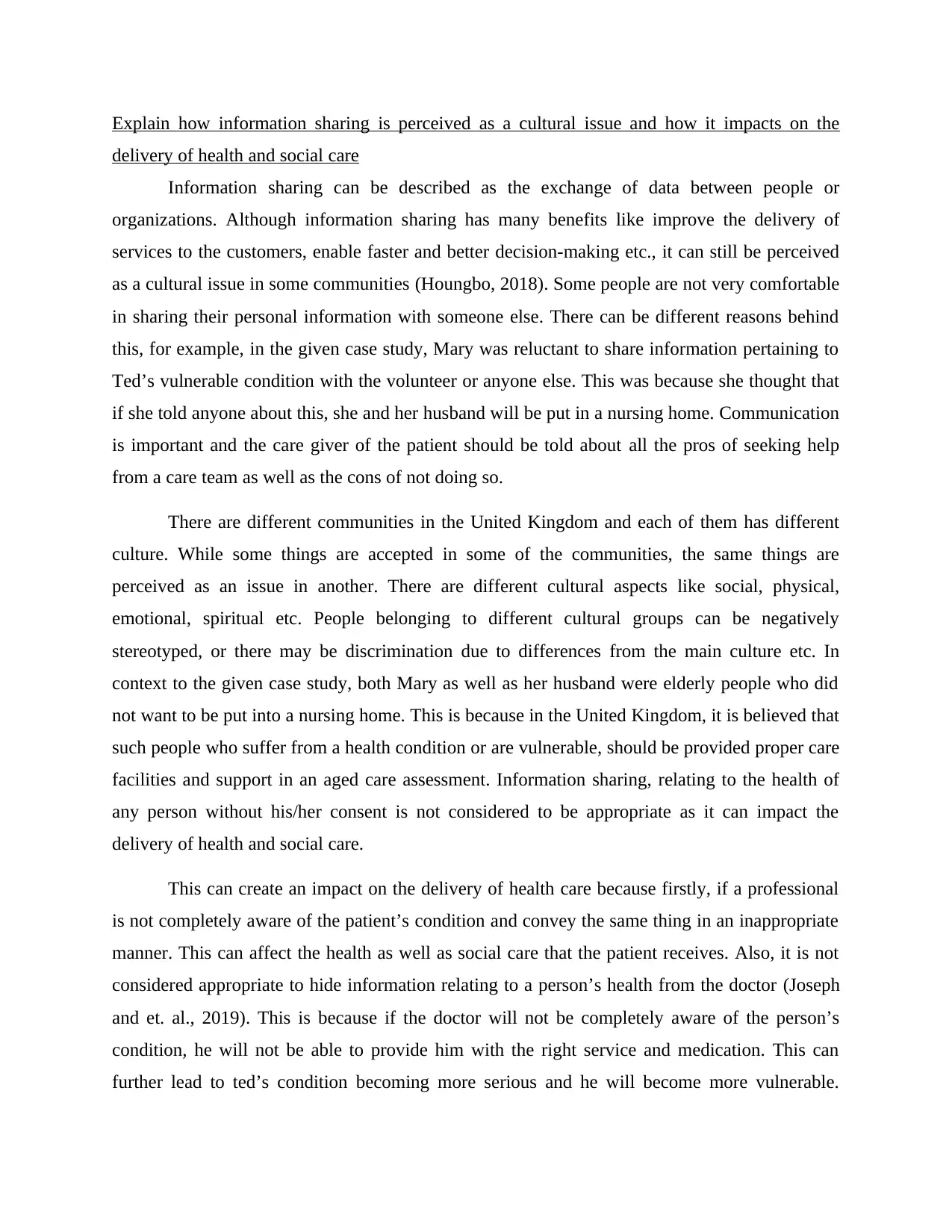
Explain how information sharing is perceived as a cultural issue and how it impacts on the
delivery of health and social care
Information sharing can be described as the exchange of data between people or
organizations. Although information sharing has many benefits like improve the delivery of
services to the customers, enable faster and better decision-making etc., it can still be perceived
as a cultural issue in some communities (Houngbo, 2018). Some people are not very comfortable
in sharing their personal information with someone else. There can be different reasons behind
this, for example, in the given case study, Mary was reluctant to share information pertaining to
Ted’s vulnerable condition with the volunteer or anyone else. This was because she thought that
if she told anyone about this, she and her husband will be put in a nursing home. Communication
is important and the care giver of the patient should be told about all the pros of seeking help
from a care team as well as the cons of not doing so.
There are different communities in the United Kingdom and each of them has different
culture. While some things are accepted in some of the communities, the same things are
perceived as an issue in another. There are different cultural aspects like social, physical,
emotional, spiritual etc. People belonging to different cultural groups can be negatively
stereotyped, or there may be discrimination due to differences from the main culture etc. In
context to the given case study, both Mary as well as her husband were elderly people who did
not want to be put into a nursing home. This is because in the United Kingdom, it is believed that
such people who suffer from a health condition or are vulnerable, should be provided proper care
facilities and support in an aged care assessment. Information sharing, relating to the health of
any person without his/her consent is not considered to be appropriate as it can impact the
delivery of health and social care.
This can create an impact on the delivery of health care because firstly, if a professional
is not completely aware of the patient’s condition and convey the same thing in an inappropriate
manner. This can affect the health as well as social care that the patient receives. Also, it is not
considered appropriate to hide information relating to a person’s health from the doctor (Joseph
and et. al., 2019). This is because if the doctor will not be completely aware of the person’s
condition, he will not be able to provide him with the right service and medication. This can
further lead to ted’s condition becoming more serious and he will become more vulnerable.
delivery of health and social care
Information sharing can be described as the exchange of data between people or
organizations. Although information sharing has many benefits like improve the delivery of
services to the customers, enable faster and better decision-making etc., it can still be perceived
as a cultural issue in some communities (Houngbo, 2018). Some people are not very comfortable
in sharing their personal information with someone else. There can be different reasons behind
this, for example, in the given case study, Mary was reluctant to share information pertaining to
Ted’s vulnerable condition with the volunteer or anyone else. This was because she thought that
if she told anyone about this, she and her husband will be put in a nursing home. Communication
is important and the care giver of the patient should be told about all the pros of seeking help
from a care team as well as the cons of not doing so.
There are different communities in the United Kingdom and each of them has different
culture. While some things are accepted in some of the communities, the same things are
perceived as an issue in another. There are different cultural aspects like social, physical,
emotional, spiritual etc. People belonging to different cultural groups can be negatively
stereotyped, or there may be discrimination due to differences from the main culture etc. In
context to the given case study, both Mary as well as her husband were elderly people who did
not want to be put into a nursing home. This is because in the United Kingdom, it is believed that
such people who suffer from a health condition or are vulnerable, should be provided proper care
facilities and support in an aged care assessment. Information sharing, relating to the health of
any person without his/her consent is not considered to be appropriate as it can impact the
delivery of health and social care.
This can create an impact on the delivery of health care because firstly, if a professional
is not completely aware of the patient’s condition and convey the same thing in an inappropriate
manner. This can affect the health as well as social care that the patient receives. Also, it is not
considered appropriate to hide information relating to a person’s health from the doctor (Joseph
and et. al., 2019). This is because if the doctor will not be completely aware of the person’s
condition, he will not be able to provide him with the right service and medication. This can
further lead to ted’s condition becoming more serious and he will become more vulnerable.
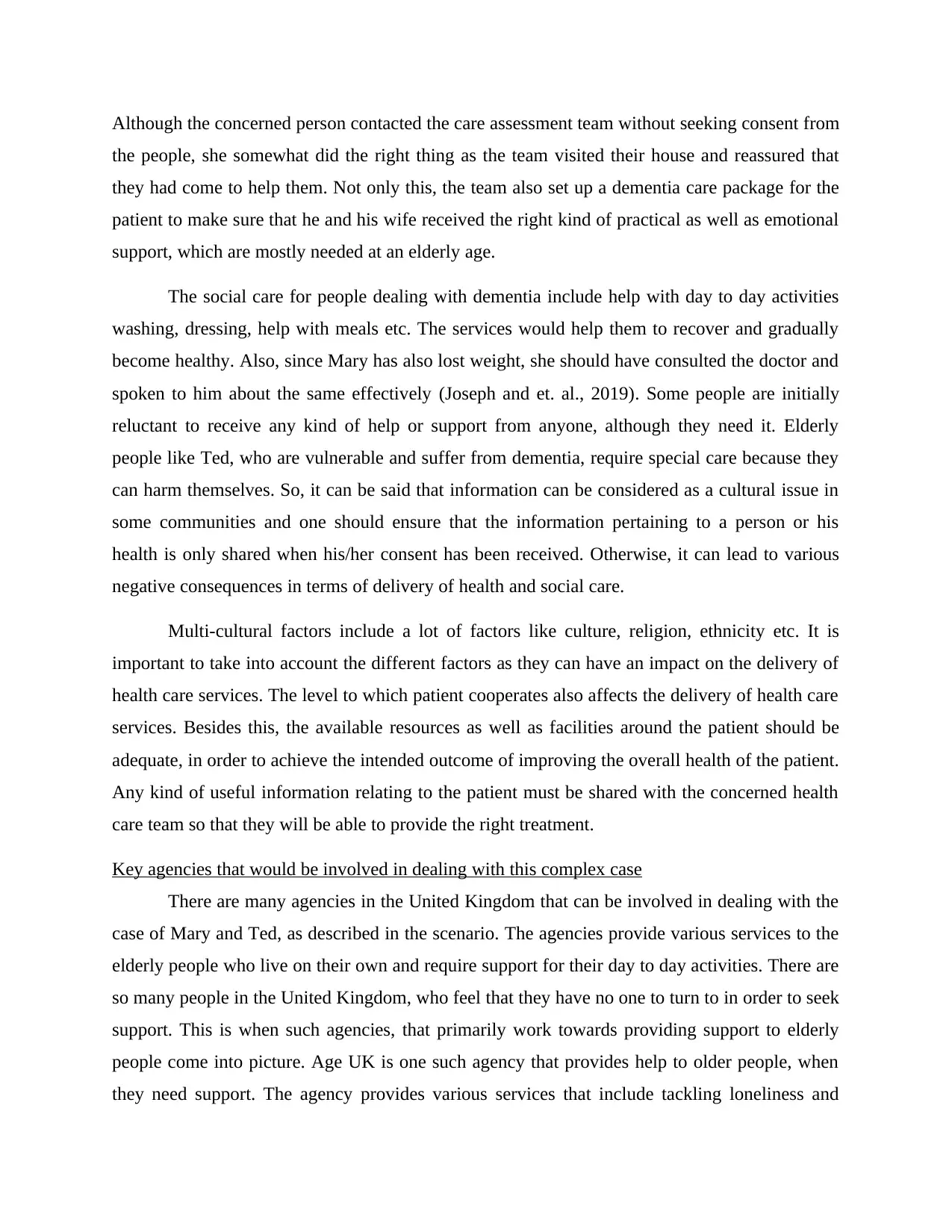
Although the concerned person contacted the care assessment team without seeking consent from
the people, she somewhat did the right thing as the team visited their house and reassured that
they had come to help them. Not only this, the team also set up a dementia care package for the
patient to make sure that he and his wife received the right kind of practical as well as emotional
support, which are mostly needed at an elderly age.
The social care for people dealing with dementia include help with day to day activities
washing, dressing, help with meals etc. The services would help them to recover and gradually
become healthy. Also, since Mary has also lost weight, she should have consulted the doctor and
spoken to him about the same effectively (Joseph and et. al., 2019). Some people are initially
reluctant to receive any kind of help or support from anyone, although they need it. Elderly
people like Ted, who are vulnerable and suffer from dementia, require special care because they
can harm themselves. So, it can be said that information can be considered as a cultural issue in
some communities and one should ensure that the information pertaining to a person or his
health is only shared when his/her consent has been received. Otherwise, it can lead to various
negative consequences in terms of delivery of health and social care.
Multi-cultural factors include a lot of factors like culture, religion, ethnicity etc. It is
important to take into account the different factors as they can have an impact on the delivery of
health care services. The level to which patient cooperates also affects the delivery of health care
services. Besides this, the available resources as well as facilities around the patient should be
adequate, in order to achieve the intended outcome of improving the overall health of the patient.
Any kind of useful information relating to the patient must be shared with the concerned health
care team so that they will be able to provide the right treatment.
Key agencies that would be involved in dealing with this complex case
There are many agencies in the United Kingdom that can be involved in dealing with the
case of Mary and Ted, as described in the scenario. The agencies provide various services to the
elderly people who live on their own and require support for their day to day activities. There are
so many people in the United Kingdom, who feel that they have no one to turn to in order to seek
support. This is when such agencies, that primarily work towards providing support to elderly
people come into picture. Age UK is one such agency that provides help to older people, when
they need support. The agency provides various services that include tackling loneliness and
the people, she somewhat did the right thing as the team visited their house and reassured that
they had come to help them. Not only this, the team also set up a dementia care package for the
patient to make sure that he and his wife received the right kind of practical as well as emotional
support, which are mostly needed at an elderly age.
The social care for people dealing with dementia include help with day to day activities
washing, dressing, help with meals etc. The services would help them to recover and gradually
become healthy. Also, since Mary has also lost weight, she should have consulted the doctor and
spoken to him about the same effectively (Joseph and et. al., 2019). Some people are initially
reluctant to receive any kind of help or support from anyone, although they need it. Elderly
people like Ted, who are vulnerable and suffer from dementia, require special care because they
can harm themselves. So, it can be said that information can be considered as a cultural issue in
some communities and one should ensure that the information pertaining to a person or his
health is only shared when his/her consent has been received. Otherwise, it can lead to various
negative consequences in terms of delivery of health and social care.
Multi-cultural factors include a lot of factors like culture, religion, ethnicity etc. It is
important to take into account the different factors as they can have an impact on the delivery of
health care services. The level to which patient cooperates also affects the delivery of health care
services. Besides this, the available resources as well as facilities around the patient should be
adequate, in order to achieve the intended outcome of improving the overall health of the patient.
Any kind of useful information relating to the patient must be shared with the concerned health
care team so that they will be able to provide the right treatment.
Key agencies that would be involved in dealing with this complex case
There are many agencies in the United Kingdom that can be involved in dealing with the
case of Mary and Ted, as described in the scenario. The agencies provide various services to the
elderly people who live on their own and require support for their day to day activities. There are
so many people in the United Kingdom, who feel that they have no one to turn to in order to seek
support. This is when such agencies, that primarily work towards providing support to elderly
people come into picture. Age UK is one such agency that provides help to older people, when
they need support. The agency provides various services that include tackling loneliness and
⊘ This is a preview!⊘
Do you want full access?
Subscribe today to unlock all pages.

Trusted by 1+ million students worldwide
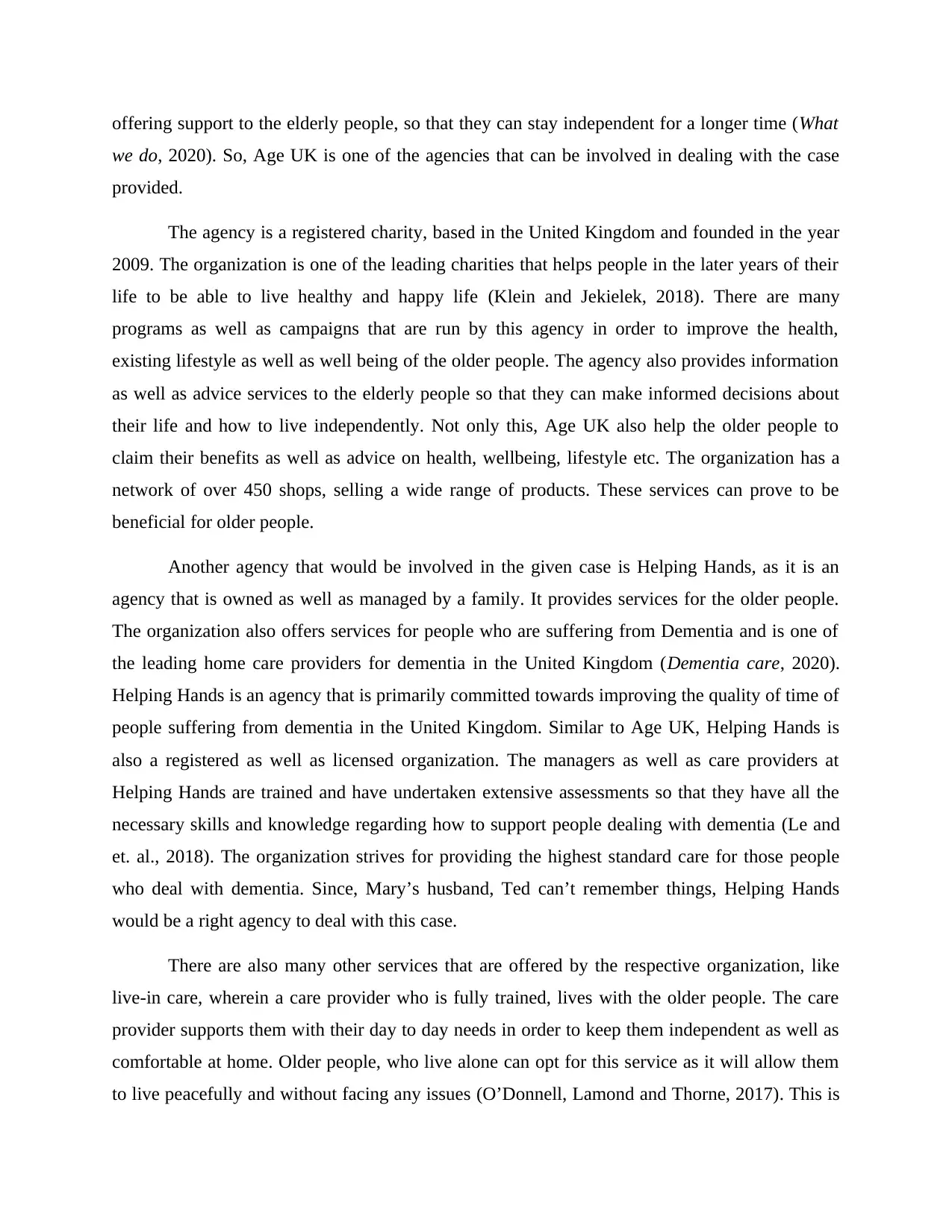
offering support to the elderly people, so that they can stay independent for a longer time (What
we do, 2020). So, Age UK is one of the agencies that can be involved in dealing with the case
provided.
The agency is a registered charity, based in the United Kingdom and founded in the year
2009. The organization is one of the leading charities that helps people in the later years of their
life to be able to live healthy and happy life (Klein and Jekielek, 2018). There are many
programs as well as campaigns that are run by this agency in order to improve the health,
existing lifestyle as well as well being of the older people. The agency also provides information
as well as advice services to the elderly people so that they can make informed decisions about
their life and how to live independently. Not only this, Age UK also help the older people to
claim their benefits as well as advice on health, wellbeing, lifestyle etc. The organization has a
network of over 450 shops, selling a wide range of products. These services can prove to be
beneficial for older people.
Another agency that would be involved in the given case is Helping Hands, as it is an
agency that is owned as well as managed by a family. It provides services for the older people.
The organization also offers services for people who are suffering from Dementia and is one of
the leading home care providers for dementia in the United Kingdom (Dementia care, 2020).
Helping Hands is an agency that is primarily committed towards improving the quality of time of
people suffering from dementia in the United Kingdom. Similar to Age UK, Helping Hands is
also a registered as well as licensed organization. The managers as well as care providers at
Helping Hands are trained and have undertaken extensive assessments so that they have all the
necessary skills and knowledge regarding how to support people dealing with dementia (Le and
et. al., 2018). The organization strives for providing the highest standard care for those people
who deal with dementia. Since, Mary’s husband, Ted can’t remember things, Helping Hands
would be a right agency to deal with this case.
There are also many other services that are offered by the respective organization, like
live-in care, wherein a care provider who is fully trained, lives with the older people. The care
provider supports them with their day to day needs in order to keep them independent as well as
comfortable at home. Older people, who live alone can opt for this service as it will allow them
to live peacefully and without facing any issues (O’Donnell, Lamond and Thorne, 2017). This is
we do, 2020). So, Age UK is one of the agencies that can be involved in dealing with the case
provided.
The agency is a registered charity, based in the United Kingdom and founded in the year
2009. The organization is one of the leading charities that helps people in the later years of their
life to be able to live healthy and happy life (Klein and Jekielek, 2018). There are many
programs as well as campaigns that are run by this agency in order to improve the health,
existing lifestyle as well as well being of the older people. The agency also provides information
as well as advice services to the elderly people so that they can make informed decisions about
their life and how to live independently. Not only this, Age UK also help the older people to
claim their benefits as well as advice on health, wellbeing, lifestyle etc. The organization has a
network of over 450 shops, selling a wide range of products. These services can prove to be
beneficial for older people.
Another agency that would be involved in the given case is Helping Hands, as it is an
agency that is owned as well as managed by a family. It provides services for the older people.
The organization also offers services for people who are suffering from Dementia and is one of
the leading home care providers for dementia in the United Kingdom (Dementia care, 2020).
Helping Hands is an agency that is primarily committed towards improving the quality of time of
people suffering from dementia in the United Kingdom. Similar to Age UK, Helping Hands is
also a registered as well as licensed organization. The managers as well as care providers at
Helping Hands are trained and have undertaken extensive assessments so that they have all the
necessary skills and knowledge regarding how to support people dealing with dementia (Le and
et. al., 2018). The organization strives for providing the highest standard care for those people
who deal with dementia. Since, Mary’s husband, Ted can’t remember things, Helping Hands
would be a right agency to deal with this case.
There are also many other services that are offered by the respective organization, like
live-in care, wherein a care provider who is fully trained, lives with the older people. The care
provider supports them with their day to day needs in order to keep them independent as well as
comfortable at home. Older people, who live alone can opt for this service as it will allow them
to live peacefully and without facing any issues (O’Donnell, Lamond and Thorne, 2017). This is
Paraphrase This Document
Need a fresh take? Get an instant paraphrase of this document with our AI Paraphraser
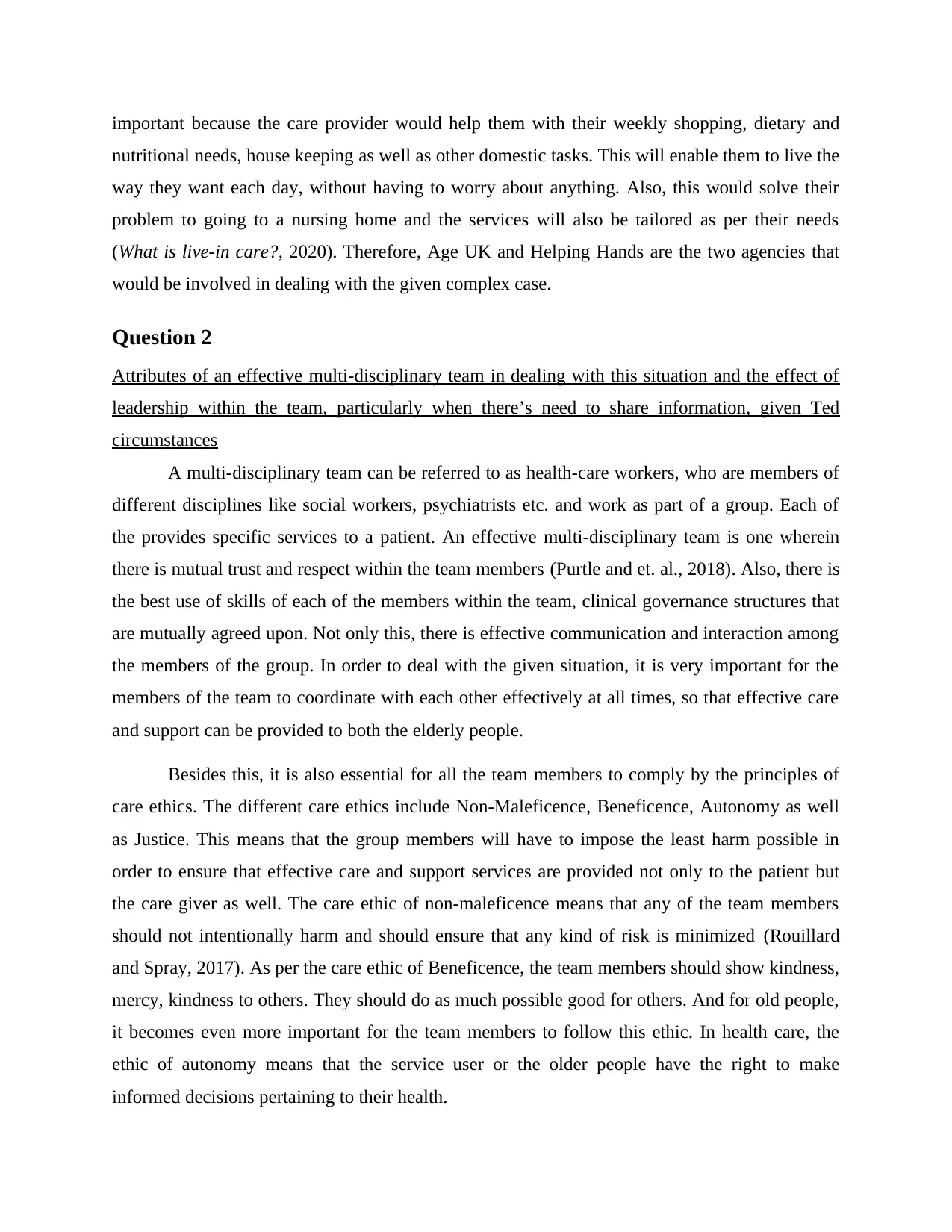
important because the care provider would help them with their weekly shopping, dietary and
nutritional needs, house keeping as well as other domestic tasks. This will enable them to live the
way they want each day, without having to worry about anything. Also, this would solve their
problem to going to a nursing home and the services will also be tailored as per their needs
(What is live-in care?, 2020). Therefore, Age UK and Helping Hands are the two agencies that
would be involved in dealing with the given complex case.
Question 2
Attributes of an effective multi-disciplinary team in dealing with this situation and the effect of
leadership within the team, particularly when there’s need to share information, given Ted
circumstances
A multi-disciplinary team can be referred to as health-care workers, who are members of
different disciplines like social workers, psychiatrists etc. and work as part of a group. Each of
the provides specific services to a patient. An effective multi-disciplinary team is one wherein
there is mutual trust and respect within the team members (Purtle and et. al., 2018). Also, there is
the best use of skills of each of the members within the team, clinical governance structures that
are mutually agreed upon. Not only this, there is effective communication and interaction among
the members of the group. In order to deal with the given situation, it is very important for the
members of the team to coordinate with each other effectively at all times, so that effective care
and support can be provided to both the elderly people.
Besides this, it is also essential for all the team members to comply by the principles of
care ethics. The different care ethics include Non-Maleficence, Beneficence, Autonomy as well
as Justice. This means that the group members will have to impose the least harm possible in
order to ensure that effective care and support services are provided not only to the patient but
the care giver as well. The care ethic of non-maleficence means that any of the team members
should not intentionally harm and should ensure that any kind of risk is minimized (Rouillard
and Spray, 2017). As per the care ethic of Beneficence, the team members should show kindness,
mercy, kindness to others. They should do as much possible good for others. And for old people,
it becomes even more important for the team members to follow this ethic. In health care, the
ethic of autonomy means that the service user or the older people have the right to make
informed decisions pertaining to their health.
nutritional needs, house keeping as well as other domestic tasks. This will enable them to live the
way they want each day, without having to worry about anything. Also, this would solve their
problem to going to a nursing home and the services will also be tailored as per their needs
(What is live-in care?, 2020). Therefore, Age UK and Helping Hands are the two agencies that
would be involved in dealing with the given complex case.
Question 2
Attributes of an effective multi-disciplinary team in dealing with this situation and the effect of
leadership within the team, particularly when there’s need to share information, given Ted
circumstances
A multi-disciplinary team can be referred to as health-care workers, who are members of
different disciplines like social workers, psychiatrists etc. and work as part of a group. Each of
the provides specific services to a patient. An effective multi-disciplinary team is one wherein
there is mutual trust and respect within the team members (Purtle and et. al., 2018). Also, there is
the best use of skills of each of the members within the team, clinical governance structures that
are mutually agreed upon. Not only this, there is effective communication and interaction among
the members of the group. In order to deal with the given situation, it is very important for the
members of the team to coordinate with each other effectively at all times, so that effective care
and support can be provided to both the elderly people.
Besides this, it is also essential for all the team members to comply by the principles of
care ethics. The different care ethics include Non-Maleficence, Beneficence, Autonomy as well
as Justice. This means that the group members will have to impose the least harm possible in
order to ensure that effective care and support services are provided not only to the patient but
the care giver as well. The care ethic of non-maleficence means that any of the team members
should not intentionally harm and should ensure that any kind of risk is minimized (Rouillard
and Spray, 2017). As per the care ethic of Beneficence, the team members should show kindness,
mercy, kindness to others. They should do as much possible good for others. And for old people,
it becomes even more important for the team members to follow this ethic. In health care, the
ethic of autonomy means that the service user or the older people have the right to make
informed decisions pertaining to their health.
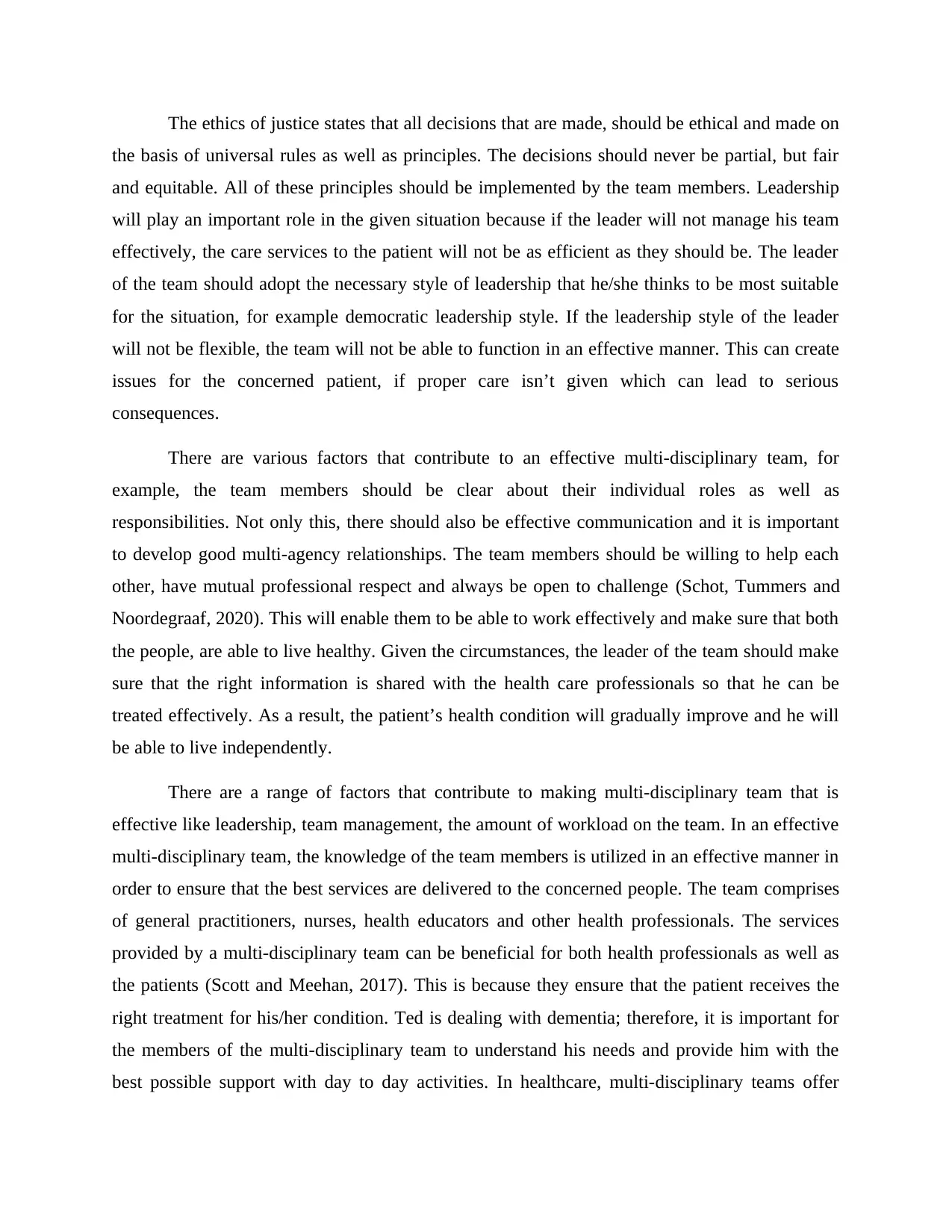
The ethics of justice states that all decisions that are made, should be ethical and made on
the basis of universal rules as well as principles. The decisions should never be partial, but fair
and equitable. All of these principles should be implemented by the team members. Leadership
will play an important role in the given situation because if the leader will not manage his team
effectively, the care services to the patient will not be as efficient as they should be. The leader
of the team should adopt the necessary style of leadership that he/she thinks to be most suitable
for the situation, for example democratic leadership style. If the leadership style of the leader
will not be flexible, the team will not be able to function in an effective manner. This can create
issues for the concerned patient, if proper care isn’t given which can lead to serious
consequences.
There are various factors that contribute to an effective multi-disciplinary team, for
example, the team members should be clear about their individual roles as well as
responsibilities. Not only this, there should also be effective communication and it is important
to develop good multi-agency relationships. The team members should be willing to help each
other, have mutual professional respect and always be open to challenge (Schot, Tummers and
Noordegraaf, 2020). This will enable them to be able to work effectively and make sure that both
the people, are able to live healthy. Given the circumstances, the leader of the team should make
sure that the right information is shared with the health care professionals so that he can be
treated effectively. As a result, the patient’s health condition will gradually improve and he will
be able to live independently.
There are a range of factors that contribute to making multi-disciplinary team that is
effective like leadership, team management, the amount of workload on the team. In an effective
multi-disciplinary team, the knowledge of the team members is utilized in an effective manner in
order to ensure that the best services are delivered to the concerned people. The team comprises
of general practitioners, nurses, health educators and other health professionals. The services
provided by a multi-disciplinary team can be beneficial for both health professionals as well as
the patients (Scott and Meehan, 2017). This is because they ensure that the patient receives the
right treatment for his/her condition. Ted is dealing with dementia; therefore, it is important for
the members of the multi-disciplinary team to understand his needs and provide him with the
best possible support with day to day activities. In healthcare, multi-disciplinary teams offer
the basis of universal rules as well as principles. The decisions should never be partial, but fair
and equitable. All of these principles should be implemented by the team members. Leadership
will play an important role in the given situation because if the leader will not manage his team
effectively, the care services to the patient will not be as efficient as they should be. The leader
of the team should adopt the necessary style of leadership that he/she thinks to be most suitable
for the situation, for example democratic leadership style. If the leadership style of the leader
will not be flexible, the team will not be able to function in an effective manner. This can create
issues for the concerned patient, if proper care isn’t given which can lead to serious
consequences.
There are various factors that contribute to an effective multi-disciplinary team, for
example, the team members should be clear about their individual roles as well as
responsibilities. Not only this, there should also be effective communication and it is important
to develop good multi-agency relationships. The team members should be willing to help each
other, have mutual professional respect and always be open to challenge (Schot, Tummers and
Noordegraaf, 2020). This will enable them to be able to work effectively and make sure that both
the people, are able to live healthy. Given the circumstances, the leader of the team should make
sure that the right information is shared with the health care professionals so that he can be
treated effectively. As a result, the patient’s health condition will gradually improve and he will
be able to live independently.
There are a range of factors that contribute to making multi-disciplinary team that is
effective like leadership, team management, the amount of workload on the team. In an effective
multi-disciplinary team, the knowledge of the team members is utilized in an effective manner in
order to ensure that the best services are delivered to the concerned people. The team comprises
of general practitioners, nurses, health educators and other health professionals. The services
provided by a multi-disciplinary team can be beneficial for both health professionals as well as
the patients (Scott and Meehan, 2017). This is because they ensure that the patient receives the
right treatment for his/her condition. Ted is dealing with dementia; therefore, it is important for
the members of the multi-disciplinary team to understand his needs and provide him with the
best possible support with day to day activities. In healthcare, multi-disciplinary teams offer
⊘ This is a preview!⊘
Do you want full access?
Subscribe today to unlock all pages.

Trusted by 1+ million students worldwide
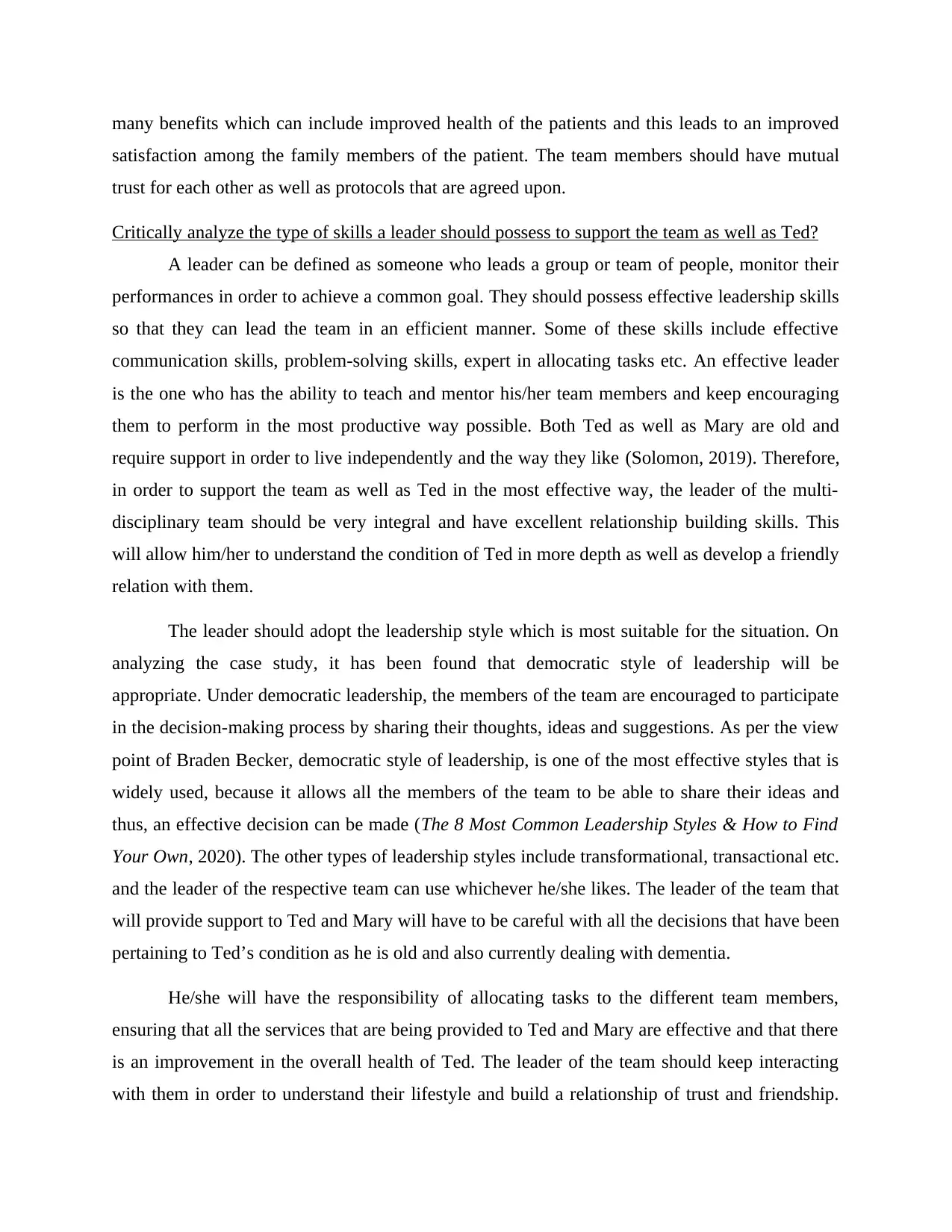
many benefits which can include improved health of the patients and this leads to an improved
satisfaction among the family members of the patient. The team members should have mutual
trust for each other as well as protocols that are agreed upon.
Critically analyze the type of skills a leader should possess to support the team as well as Ted?
A leader can be defined as someone who leads a group or team of people, monitor their
performances in order to achieve a common goal. They should possess effective leadership skills
so that they can lead the team in an efficient manner. Some of these skills include effective
communication skills, problem-solving skills, expert in allocating tasks etc. An effective leader
is the one who has the ability to teach and mentor his/her team members and keep encouraging
them to perform in the most productive way possible. Both Ted as well as Mary are old and
require support in order to live independently and the way they like (Solomon, 2019). Therefore,
in order to support the team as well as Ted in the most effective way, the leader of the multi-
disciplinary team should be very integral and have excellent relationship building skills. This
will allow him/her to understand the condition of Ted in more depth as well as develop a friendly
relation with them.
The leader should adopt the leadership style which is most suitable for the situation. On
analyzing the case study, it has been found that democratic style of leadership will be
appropriate. Under democratic leadership, the members of the team are encouraged to participate
in the decision-making process by sharing their thoughts, ideas and suggestions. As per the view
point of Braden Becker, democratic style of leadership, is one of the most effective styles that is
widely used, because it allows all the members of the team to be able to share their ideas and
thus, an effective decision can be made (The 8 Most Common Leadership Styles & How to Find
Your Own, 2020). The other types of leadership styles include transformational, transactional etc.
and the leader of the respective team can use whichever he/she likes. The leader of the team that
will provide support to Ted and Mary will have to be careful with all the decisions that have been
pertaining to Ted’s condition as he is old and also currently dealing with dementia.
He/she will have the responsibility of allocating tasks to the different team members,
ensuring that all the services that are being provided to Ted and Mary are effective and that there
is an improvement in the overall health of Ted. The leader of the team should keep interacting
with them in order to understand their lifestyle and build a relationship of trust and friendship.
satisfaction among the family members of the patient. The team members should have mutual
trust for each other as well as protocols that are agreed upon.
Critically analyze the type of skills a leader should possess to support the team as well as Ted?
A leader can be defined as someone who leads a group or team of people, monitor their
performances in order to achieve a common goal. They should possess effective leadership skills
so that they can lead the team in an efficient manner. Some of these skills include effective
communication skills, problem-solving skills, expert in allocating tasks etc. An effective leader
is the one who has the ability to teach and mentor his/her team members and keep encouraging
them to perform in the most productive way possible. Both Ted as well as Mary are old and
require support in order to live independently and the way they like (Solomon, 2019). Therefore,
in order to support the team as well as Ted in the most effective way, the leader of the multi-
disciplinary team should be very integral and have excellent relationship building skills. This
will allow him/her to understand the condition of Ted in more depth as well as develop a friendly
relation with them.
The leader should adopt the leadership style which is most suitable for the situation. On
analyzing the case study, it has been found that democratic style of leadership will be
appropriate. Under democratic leadership, the members of the team are encouraged to participate
in the decision-making process by sharing their thoughts, ideas and suggestions. As per the view
point of Braden Becker, democratic style of leadership, is one of the most effective styles that is
widely used, because it allows all the members of the team to be able to share their ideas and
thus, an effective decision can be made (The 8 Most Common Leadership Styles & How to Find
Your Own, 2020). The other types of leadership styles include transformational, transactional etc.
and the leader of the respective team can use whichever he/she likes. The leader of the team that
will provide support to Ted and Mary will have to be careful with all the decisions that have been
pertaining to Ted’s condition as he is old and also currently dealing with dementia.
He/she will have the responsibility of allocating tasks to the different team members,
ensuring that all the services that are being provided to Ted and Mary are effective and that there
is an improvement in the overall health of Ted. The leader of the team should keep interacting
with them in order to understand their lifestyle and build a relationship of trust and friendship.
Paraphrase This Document
Need a fresh take? Get an instant paraphrase of this document with our AI Paraphraser
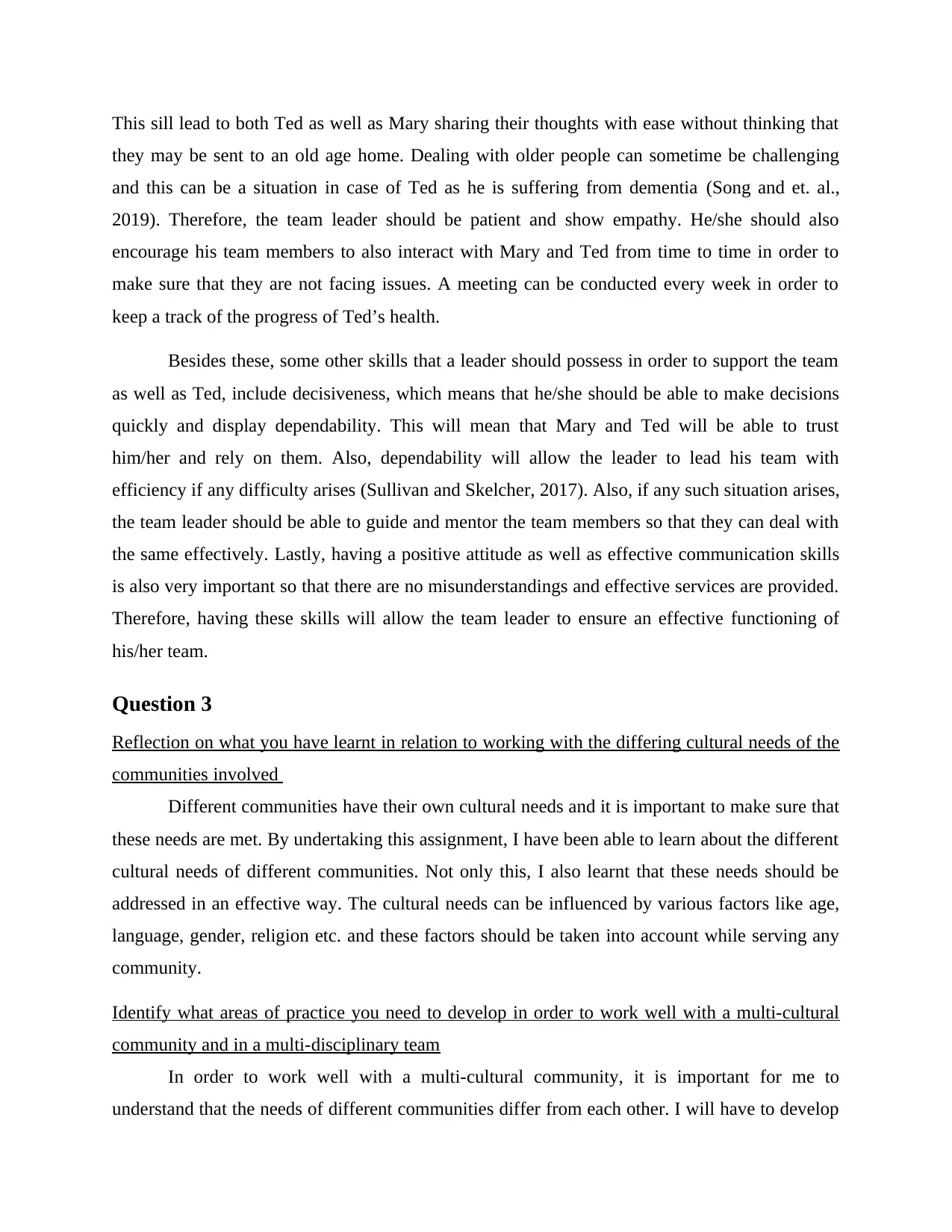
This sill lead to both Ted as well as Mary sharing their thoughts with ease without thinking that
they may be sent to an old age home. Dealing with older people can sometime be challenging
and this can be a situation in case of Ted as he is suffering from dementia (Song and et. al.,
2019). Therefore, the team leader should be patient and show empathy. He/she should also
encourage his team members to also interact with Mary and Ted from time to time in order to
make sure that they are not facing issues. A meeting can be conducted every week in order to
keep a track of the progress of Ted’s health.
Besides these, some other skills that a leader should possess in order to support the team
as well as Ted, include decisiveness, which means that he/she should be able to make decisions
quickly and display dependability. This will mean that Mary and Ted will be able to trust
him/her and rely on them. Also, dependability will allow the leader to lead his team with
efficiency if any difficulty arises (Sullivan and Skelcher, 2017). Also, if any such situation arises,
the team leader should be able to guide and mentor the team members so that they can deal with
the same effectively. Lastly, having a positive attitude as well as effective communication skills
is also very important so that there are no misunderstandings and effective services are provided.
Therefore, having these skills will allow the team leader to ensure an effective functioning of
his/her team.
Question 3
Reflection on what you have learnt in relation to working with the differing cultural needs of the
communities involved
Different communities have their own cultural needs and it is important to make sure that
these needs are met. By undertaking this assignment, I have been able to learn about the different
cultural needs of different communities. Not only this, I also learnt that these needs should be
addressed in an effective way. The cultural needs can be influenced by various factors like age,
language, gender, religion etc. and these factors should be taken into account while serving any
community.
Identify what areas of practice you need to develop in order to work well with a multi-cultural
community and in a multi-disciplinary team
In order to work well with a multi-cultural community, it is important for me to
understand that the needs of different communities differ from each other. I will have to develop
they may be sent to an old age home. Dealing with older people can sometime be challenging
and this can be a situation in case of Ted as he is suffering from dementia (Song and et. al.,
2019). Therefore, the team leader should be patient and show empathy. He/she should also
encourage his team members to also interact with Mary and Ted from time to time in order to
make sure that they are not facing issues. A meeting can be conducted every week in order to
keep a track of the progress of Ted’s health.
Besides these, some other skills that a leader should possess in order to support the team
as well as Ted, include decisiveness, which means that he/she should be able to make decisions
quickly and display dependability. This will mean that Mary and Ted will be able to trust
him/her and rely on them. Also, dependability will allow the leader to lead his team with
efficiency if any difficulty arises (Sullivan and Skelcher, 2017). Also, if any such situation arises,
the team leader should be able to guide and mentor the team members so that they can deal with
the same effectively. Lastly, having a positive attitude as well as effective communication skills
is also very important so that there are no misunderstandings and effective services are provided.
Therefore, having these skills will allow the team leader to ensure an effective functioning of
his/her team.
Question 3
Reflection on what you have learnt in relation to working with the differing cultural needs of the
communities involved
Different communities have their own cultural needs and it is important to make sure that
these needs are met. By undertaking this assignment, I have been able to learn about the different
cultural needs of different communities. Not only this, I also learnt that these needs should be
addressed in an effective way. The cultural needs can be influenced by various factors like age,
language, gender, religion etc. and these factors should be taken into account while serving any
community.
Identify what areas of practice you need to develop in order to work well with a multi-cultural
community and in a multi-disciplinary team
In order to work well with a multi-cultural community, it is important for me to
understand that the needs of different communities differ from each other. I will have to develop
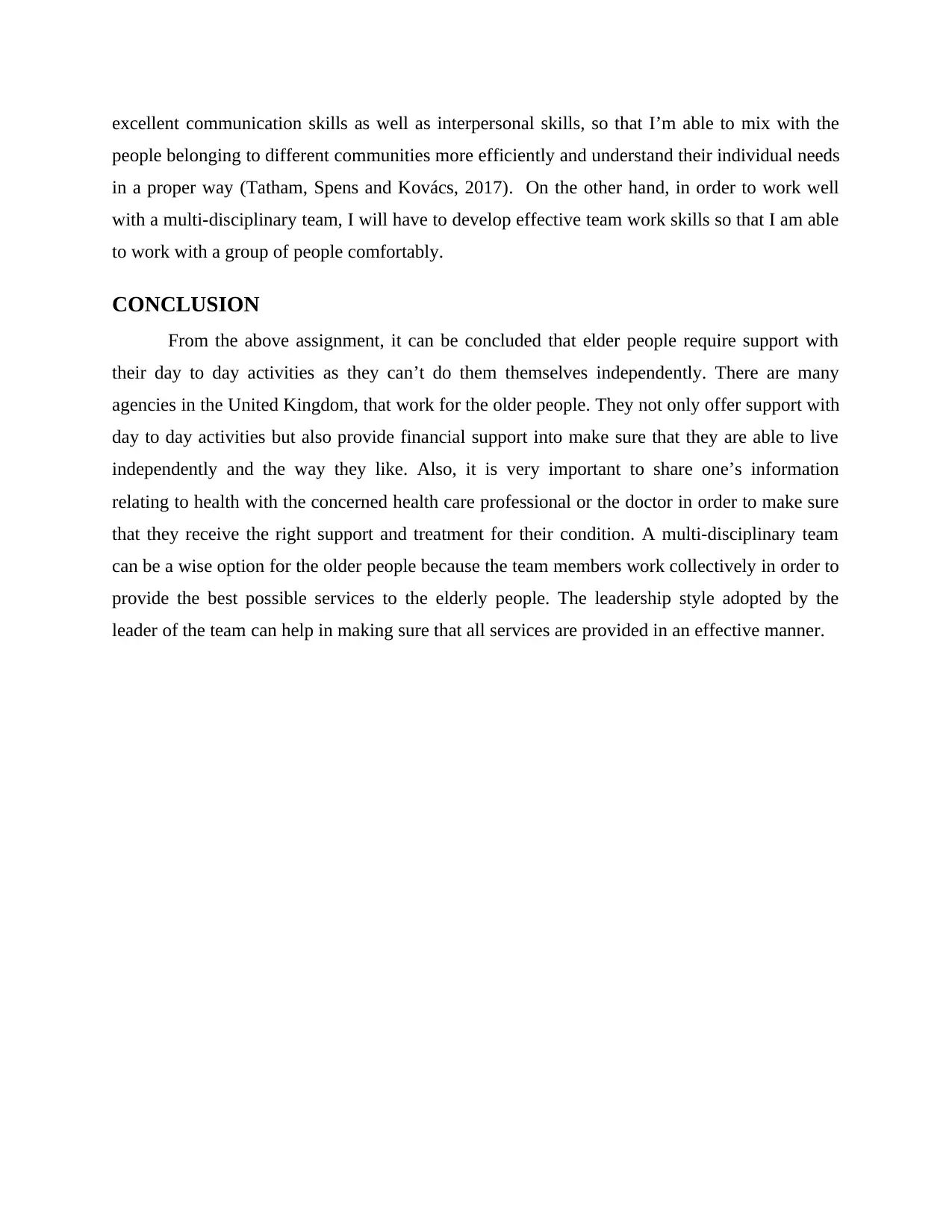
excellent communication skills as well as interpersonal skills, so that I’m able to mix with the
people belonging to different communities more efficiently and understand their individual needs
in a proper way (Tatham, Spens and Kovács, 2017). On the other hand, in order to work well
with a multi-disciplinary team, I will have to develop effective team work skills so that I am able
to work with a group of people comfortably.
CONCLUSION
From the above assignment, it can be concluded that elder people require support with
their day to day activities as they can’t do them themselves independently. There are many
agencies in the United Kingdom, that work for the older people. They not only offer support with
day to day activities but also provide financial support into make sure that they are able to live
independently and the way they like. Also, it is very important to share one’s information
relating to health with the concerned health care professional or the doctor in order to make sure
that they receive the right support and treatment for their condition. A multi-disciplinary team
can be a wise option for the older people because the team members work collectively in order to
provide the best possible services to the elderly people. The leadership style adopted by the
leader of the team can help in making sure that all services are provided in an effective manner.
people belonging to different communities more efficiently and understand their individual needs
in a proper way (Tatham, Spens and Kovács, 2017). On the other hand, in order to work well
with a multi-disciplinary team, I will have to develop effective team work skills so that I am able
to work with a group of people comfortably.
CONCLUSION
From the above assignment, it can be concluded that elder people require support with
their day to day activities as they can’t do them themselves independently. There are many
agencies in the United Kingdom, that work for the older people. They not only offer support with
day to day activities but also provide financial support into make sure that they are able to live
independently and the way they like. Also, it is very important to share one’s information
relating to health with the concerned health care professional or the doctor in order to make sure
that they receive the right support and treatment for their condition. A multi-disciplinary team
can be a wise option for the older people because the team members work collectively in order to
provide the best possible services to the elderly people. The leadership style adopted by the
leader of the team can help in making sure that all services are provided in an effective manner.
⊘ This is a preview!⊘
Do you want full access?
Subscribe today to unlock all pages.

Trusted by 1+ million students worldwide
1 out of 14
Related Documents
Your All-in-One AI-Powered Toolkit for Academic Success.
+13062052269
info@desklib.com
Available 24*7 on WhatsApp / Email
![[object Object]](/_next/static/media/star-bottom.7253800d.svg)
Unlock your academic potential
Copyright © 2020–2026 A2Z Services. All Rights Reserved. Developed and managed by ZUCOL.





